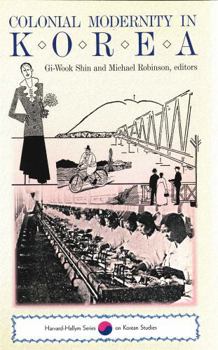Colonial Modernity in Korea
(Book #184 in the Harvard East Asian Monographs Series)
Select Format
Select Condition 
Book Overview
The twelve chapters in this volume seek to overcome the nationalist paradigm of Japanese repression and exploitation versus Korean resistance that has dominated the study of Korea's colonial period (1910-1945) by adopting a more inclusive, pluralistic approach that stresses the complex relations among colonialism, modernity, and nationalism. By addressing such diverse subjects as the colonial legal system, radio, telecommunications, the rural economy,...
Format:Paperback
Language:English
ISBN:0674005945
ISBN13:9780674005945
Release Date:September 2001
Publisher:Harvard University Press
Length:496 Pages
Weight:1.60 lbs.
Dimensions:1.3" x 5.9" x 9.0"
Customer Reviews
0 rating





